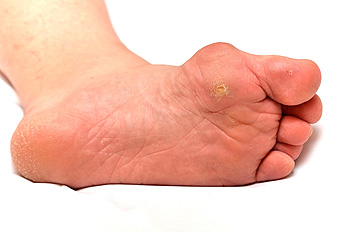Freehold (732) 294-9393
Freehold (732) 294-9393
 A corn on the foot is a small, hardened portion of skin that develops as a result of excess friction which occurs to that part of the foot. They are known to develop in specific areas of the foot, which often includes the sides or bottom of the feet, between the toes, or possibly underneath the toenail bed. They can be quite painful, especially while wearing shoes, and may appear to have a rough texture. Common reasons why corns may develop can come from wearing shoes that are too tight, or from standing or walking for extended periods of time. Mild relief may be found by putting a corn pad over the affected area, and this may be effective in relieving a portion of the pressure. If you have a corn that will not heal, it is suggested to speak with a podiatrist who can offer additional treatment options.
A corn on the foot is a small, hardened portion of skin that develops as a result of excess friction which occurs to that part of the foot. They are known to develop in specific areas of the foot, which often includes the sides or bottom of the feet, between the toes, or possibly underneath the toenail bed. They can be quite painful, especially while wearing shoes, and may appear to have a rough texture. Common reasons why corns may develop can come from wearing shoes that are too tight, or from standing or walking for extended periods of time. Mild relief may be found by putting a corn pad over the affected area, and this may be effective in relieving a portion of the pressure. If you have a corn that will not heal, it is suggested to speak with a podiatrist who can offer additional treatment options.
Corns can make walking very painful and should be treated immediately. If you have questions regarding your feet and ankles, contact Dr. Henry Miller of New Jersey. Our doctor will treat your foot and ankle needs.
Corns: What Are They? And How Do You Get Rid of Them?
Corns are thickened areas on the skin that can become painful. They are caused by excessive pressure and friction on the skin. Corns press into the deeper layers of the skin and are usually round in shape.
Ways to Prevent Corns
There are many ways to get rid of painful corns such as:
Treating Corns
Although most corns slowly disappear when the friction or pressure stops, this isn’t always the case. Consult with your podiatrist to determine the best treatment option for your case of corns.
If you have any questions please feel free to contact our office located in Freehold, NJ . We offer the newest diagnostic and treatment technologies for all your foot and ankle needs.
Contracting athlete’s foot can happen to anyone, but there are some risk factors that increase the chance of contracting this inconvenient condition. Public places like locker rooms, showers, and swimming pools are breeding grounds for bacteria, so exposing your bare feet to surfaces in these environments could easily lead to athlete’s foot. Sharing footwear or towels with someone who has been infected can spread the infection, so it’s best to avoid sharing these items. Wet or sweaty feet are also at a higher risk than feet that are kept dry and clean, because bacteria thrive in moist environments. Minor skin or nail injuries, especially in tight closed-toe shoes are also a risk factor. If you think you might have athlete’s foot or would like additional information on how to prevent it, then it is suggested you speak with a podiatrist.
Athlete’s foot is an inconvenient condition that can be easily reduced with the proper treatment. If you have any concerns about your feet and ankles, contact Dr. Henry Miller from New Jersey. Our doctor will treat your foot and ankle needs.
Athlete’s Foot: The Sole Story
Athlete's foot, also known as tinea pedis, can be an extremely contagious foot infection. It is commonly contracted in public changing areas and bathrooms, dormitory style living quarters, around locker rooms and public swimming pools, or anywhere your feet often come into contact with other people.
Solutions to Combat Athlete’s Foot
Athlete’s foot can cause many irritating symptoms such as dry and flaking skin, itching, and redness. Some more severe symptoms can include bleeding and cracked skin, intense itching and burning, and even pain when walking. In the worst cases, Athlete’s foot can cause blistering as well. Speak to your podiatrist for a better understanding of the different causes of Athlete’s foot, as well as help in determining which treatment options are best for you.
If you have any questions please feel free to contact our office located in Freehold, NJ . We offer the newest diagnostic and treatment technologies for all your foot and ankle needs.
 The symptoms of a plantar wart include pain and discomfort that is felt in the heel area of the foot. This is a result of the wart growing into the heel, which differs from warts on other parts of the body that grow outward. This condition is known to be contagious and prevention may be obtained by using your own towels and other personal items. If you have a plantar wart, it may dissolve on its own. If it causes severe pain and you are having difficulty in walking, it is suggested to speak to a podiatrist who can perform freezing techniques or possibly recommend surgery, which may be helpful in removing the wart.
The symptoms of a plantar wart include pain and discomfort that is felt in the heel area of the foot. This is a result of the wart growing into the heel, which differs from warts on other parts of the body that grow outward. This condition is known to be contagious and prevention may be obtained by using your own towels and other personal items. If you have a plantar wart, it may dissolve on its own. If it causes severe pain and you are having difficulty in walking, it is suggested to speak to a podiatrist who can perform freezing techniques or possibly recommend surgery, which may be helpful in removing the wart.
Plantar warts can be very uncomfortable. If you need your feet checked, contact Dr. Henry Miller from New Jersey. Our doctor will assist you with all of your foot and ankle needs.
About Plantar Warts
Plantar warts are the result of HPV, or human papillomavirus, getting into open wounds on the feet. They are mostly found on the heels or balls of the feet.
While plantar warts are generally harmless, those experiencing excessive pain or those suffering from diabetes or a compromised immune system require immediate medical care. Plantar warts are easily diagnosed, usually through scraping off a bit of rough skin or by getting a biopsy.
Symptoms
Treatment
To help prevent developing plantar warts, avoid walking barefoot over abrasive surfaces that can cause cuts or wounds for HPV to get into. Avoiding direct contact with other warts, as well as not picking or rubbing existing warts, can help prevent the further spread of plantar warts. However, if you think you have developed plantar warts, speak to your podiatrist. He or she can diagnose the warts on your feet and recommend the appropriate treatment options.
If you have any questions please feel free to contact our office located in Freehold, NJ . We offer the newest diagnostic and treatment technologies for all your foot and ankle needs.
 There are several reasons why having foot surgery performed may benefit the overall health of the feet. These may include restoring mobility in the foot or ankle, relieving pain that may be present, or possibly correcting a foot deformity. Removing an ingrown toenail may be an option if the nail is severely infected. If you have a bunion that is causing extreme pain and discomfort, bunion surgery may be an option to think about if other treatments have not been successful. Patients who have sustained an injury to the joints of the ankle may consider having ankle replacement surgery performed. This may be used as a last resort to regain mobility and strength in the ankle and surrounding areas. If you have foot conditions, which may benefit by having surgery performed, it is advised to consult with a podiatrist who can properly assist you.
There are several reasons why having foot surgery performed may benefit the overall health of the feet. These may include restoring mobility in the foot or ankle, relieving pain that may be present, or possibly correcting a foot deformity. Removing an ingrown toenail may be an option if the nail is severely infected. If you have a bunion that is causing extreme pain and discomfort, bunion surgery may be an option to think about if other treatments have not been successful. Patients who have sustained an injury to the joints of the ankle may consider having ankle replacement surgery performed. This may be used as a last resort to regain mobility and strength in the ankle and surrounding areas. If you have foot conditions, which may benefit by having surgery performed, it is advised to consult with a podiatrist who can properly assist you.
Foot surgery is sometimes necessary to treat a foot ailment. To learn more, contact Dr. Henry Miller of New Jersey. Our doctor will assist you with all of your foot and ankle needs.
When Is Surgery Necessary?
Foot and ankle surgery is generally reserved for cases in which less invasive, conservative procedures have failed to alleviate the problem. Some of the cases in which surgery may be necessary include:
What Types of Surgery Are There?
The type of surgery you receive will depend on the nature of the problem you have. Some of the possible surgeries include:
Benefits of Surgery
Although surgery is usually a last resort, it can provide more complete pain relief compared to non-surgical methods and may allow you to finally resume full activity.
Surgical techniques have also become increasingly sophisticated. Techniques like endoscopic surgery allow for smaller incisions and faster recovery times.
If you have any questions please feel free to contact our office located in Freehold, NJ . We offer the newest diagnostic and treatment technologies for all your foot and ankle needs.